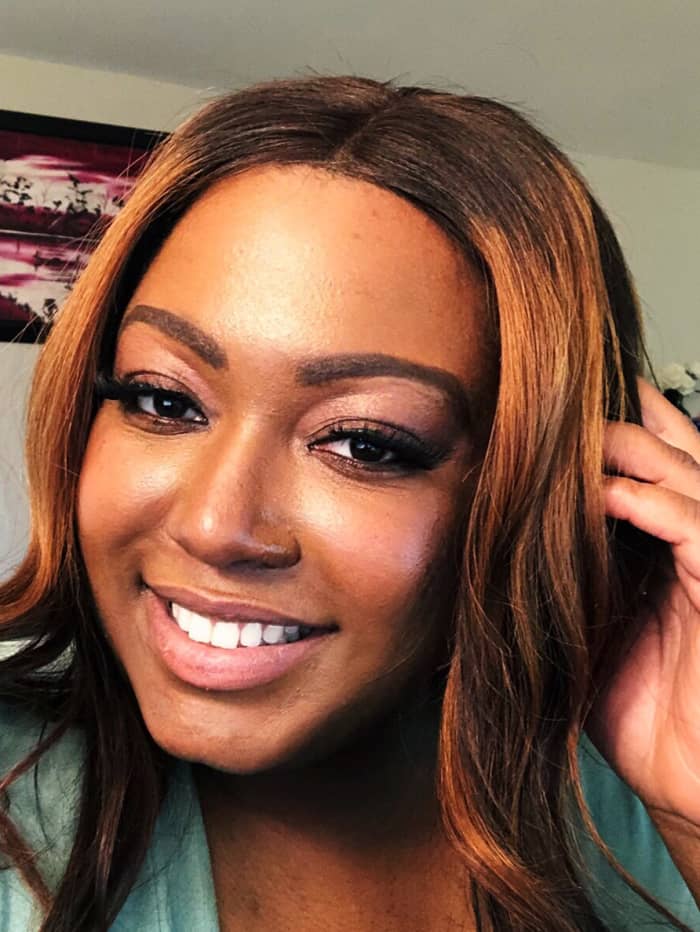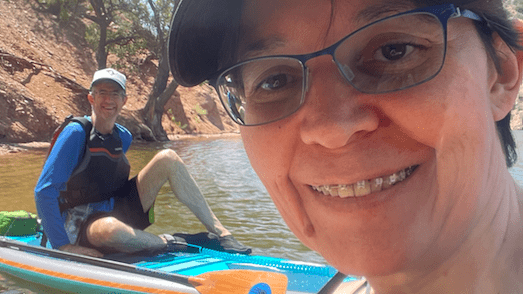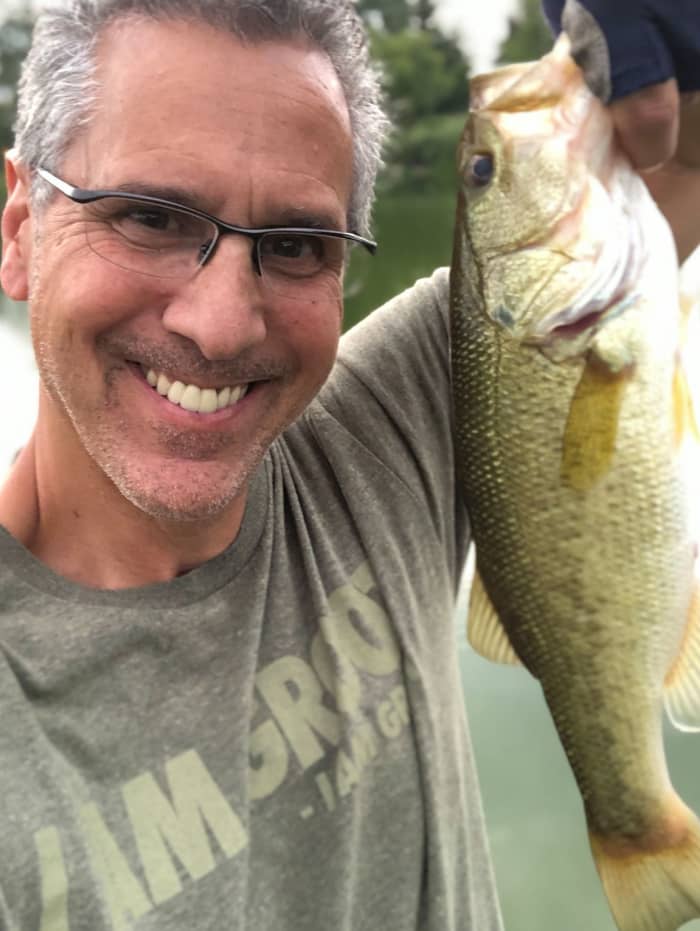Working at a grocery store during a pandemic is nerve-wracking enough. It’s even more stressful for a COVID-19 long hauler concerned with contracting a breakthrough infection and facing the financial fallout.
“That’s what I worry about: If I get it again, will it do me in where I can’t work?” said Robin Lagua, 52, of Edgewood, Wash., who works as a supermarket cashier and still deals with the effects of her relatively mild July 2020 infection. (Vaccination has been shown to reduce the risk of reinfection, and breakthrough infections are less likely to result in serious illness.)
Recent coronavirus cases among Lagua’s coworkers also weigh on her. She’s vocal about her long-hauler experience, but wonders if anyone is listening. “People think, ‘Oh, that’s not gonna happen to me,’” she said. “I still have friends getting sick, going to the hospital, not getting vaccinated.”
“‘People think, “Oh, that’s not gonna happen to me.”‘”
Lagua is one of five long haulers — an informal term often used to describe people who don’t return to their usual health status after a COVID-19 infection or develop new or recurring symptoms — who previously spoke with MarketWatch in March before vaccinations became widely available in the U.S.
Much remains unknown about Long Covid, also known as post-acute sequelae of SARS-CoV-2 infection (PASC), among other names. But a National Institutes of Health initiative to study causes, prevention and treatment for post-COVID-19 conditions is underway, and the federal government said in July that people whose Long Covid qualifies as a disability are protected under anti-discrimination laws.
Nearly six months after they first spoke with MarketWatch, the five now-vaccinated long haulers described new and shifting health and financial concerns — and, in some cases, progress.
‘Why am I paying these bills?’
Like some long haulers, Lagua believes getting the COVID-19 vaccine may have improved her symptoms. Her joint, muscle and nerve pain no longer come with the same severity or frequency, though they’re still there. She has felt winded more often lately and developed a cough.
Despite some relief, she feels frustrated by the lack of concrete solutions. Because doctors are often unable to diagnose her, don’t take her seriously or simply tell her things she already knows, Lagua has turned to Facebook FB, +0.18% for home remedies and diets that may help.
She has completed a payment plan to pay off one $ 400 medical bill, and is now paying another $ 400 bill in installments. “I’m like, ‘Why am I paying these bills? I’m not getting answers,’” she said.
Lagua also recently learned she will have to leave her below-market-rent apartment because her landlord’s family now plans to sell their property to investors or developers. She feels torn between moving back to her hometown of Maui, where her mother owns property, and sticking around Washington state, where she put down roots three decades ago.
Another immediate goal: convincing her unvaccinated 26-year-old daughter to get the shot. While Lagua said she would respect her daughter’s views, she also said she was disappointed. She planned to share real-life anecdotes illustrating the dangers of remaining unvaccinated when her daughter came for a weeklong visit.
“If I show her more than tell her, maybe that might be the way to go,” she said. “And I think when she gets here, she’ll realize how much she can’t do here without being vaccinated.”

‘It is a mixture of sadness, frustration, anger, and still trying to keep some semblance of compassion,’ says Heather-Elizabeth Brown of people she knows who won’t get vaccinated.
Heather-Elizabeth Brown
‘Recovery is a moving target’
Heather-Elizabeth Brown, a corporate trainer who lives outside of Detroit, Mich., and spent 31 days on a ventilator with COVID-19 in spring of 2020, recently returned to work after a seven-week medical leave to address symptoms stemming from high blood pressure — burning through sick days and vacation days before going on short-term disability leave.
While Brown, 36, is happy to be back on the job, she also has to remind herself to balance work with self-care. Her brain fog has improved a bit, but she still deals with fatigue, diminished breathing capacity and other issues. Her employer allowing her to restrict work hours has helped, as has carving out time for medical appointments and incorporating rest into her day.
An important change in the past couple of months, she added, has been “recognizing and accepting that recovery is a moving target.” That means not beating herself up when she falls short of the goals she sets.
It came as “a great relief” when Brown recently learned that an anonymous donor had paid off more than $ 54,000 from one of her multiple hospital stays, though she remains in about $ 200,000 of medical debt. “That’s a huge chunk out of the debt, but it’s still just a staggering amount,” she said. She may negotiate with her insurance company to cover more, and is considering launching a GoFundMe campaign.
Brown, who still masks up and practices social distancing due to her fear of being infected with the delta variant, feels hurt that some people who know about her near-fatal bout with COVID-19 still won’t get vaccinated. “It is a mixture of sadness, frustration, anger, and still trying to keep some semblance of compassion,” she said.
She wonders whether having an authorized vaccine last year when she contracted the virus could have saved her from such a severe case. “I didn’t have that choice,” she said. “But there are people who do, and they don’t take it, and that’s sad.”

Emily Haozous and her husband go paddleboarding.
Emily Haozous
‘There’s this cumulative fatigue’
Some of the brain fog has lifted for Emily Haozous, a 48-year-old nurse researcher and enrolled member of the Chiricahua Fort Sill Apache tribe who lives in Santa Fe, N.M., and contracted the coronavirus in March 2020. But her cold-like symptoms and fatigue persist — a sameness that has fostered a sense of “creeping dread” about the future.
Haozous loves her job and has made some accommodations, such as working around early-morning brain fog. She gets “super tired” toward the end of the work day, at which point she has to nap and make up the leftover work during the weekend. Compared to six months earlier, “I feel now that there’s this cumulative fatigue where I can’t just power through,” she said.
Moral support and cooking help from Haozous’s husband and two kids have helped, as has the distraction offered by “really, really bad” free romance audiobooks.
Haozous said she has started coming to terms with the possibility that she may be living with Long Covid for longer than she expected. She’s considering getting a walker with a seat for when she has to stand for long periods, like in a supermarket line.
“If I want to go do something like paddleboarding or go to a concert, I have to rest for two weeks, and then I do that thing, and then I feel like shit for a week,” she said. “But it was really nice to go paddleboarding.”
‘A pretty scary and traumatic time’
Nicole, a 34-year-old in the Washington, D.C., area who asked to be identified only by her middle name, still has lingering symptoms and flare-ups after contracting COVID-19 nearly a year ago. But she is in “a much better place,” progress she attributes to getting vaccinated, working with an acupuncturist and naturopathic doctors, and taking supplements to address vitamin deficiencies.
While Nicole must pay out of pocket for much of the alternative medicine, she has reallocated spending on other expenses — like getting her nails done and buying clothes — to what she sees as an investment in her health.
Nicole, who is halfway through paying down $ 7,500 in medical debt, said it was a relief to be back at work with income coming in. “You do sometimes feel like you’re put up against the wall of, ‘Do I go into more medical debt, or do I just suffer and hope things get better?’” she said. “And I had health insurance.”
Therapy has helped her come to terms with the gravity of what she has experienced, she added — and acknowledge that while she survived COVID-19 and has been fortunate not to have worse complications, “this was actually a very serious thing to go through.”
“I have to sit with all that’s transpired over the past year, and identify that this was a pretty scary and traumatic time to have lived through,” Nicole said.

‘I can only do it for two or three hours, because my legs get tired and my breathing gets a little bit shallow and my shoulder hurts,’ says Lynus Parker of fishing.
Lynus Parker
‘I try to pay it forward’
Lynus Parker of Novi, Mich., is ready to get back to life without the physical limitations he has had since spending 32 days on a ventilator, in and out of a coma, in April 2020. But he has also grown used to them.
“It’s really humbling for me to want to go out fishing for half a day, and I can’t do it — I can only do it for two or three hours, because my legs get tired and my breathing gets a little bit shallow and my shoulder hurts,” said Parker, who is in his 50s.
Parker still deals with paralysis of the right side of his diaphragm, which impacts his breathing and endurance. To that end, he plans to travel to New Jersey in November to undergo a phrenic nerve reconstruction surgery that he hopes will reverse the paralysis.
“The next step is to get the insurance company to put [the doctor] into a category where he’s considered in network,” Parker said. There will be additional travel and lodging costs even if his insurance covers the procedure, he added — “but it’s kind of hard to put a price tag on the opportunity to regain function of my diaphragm, so that I can breathe deeply again and regain another level of normalcy.”
Parker, who maintains a Facebook group for long haulers, says many people now seek him out for advice based on his own experience. He is considering hosting a Zoom ZM, +1.91% town hall, perhaps in coordination with a healthcare provider, to field questions about vaccination and the virus’s impact on people’s lives and finances.
“I really believe that not only did God save me, but He also has been looking down on me,” Parker said. “I don’t feel worthy of all the majesty that He’s bestowed upon me, but I accept it and I try to pay it forward.”
Also read:
Long COVID risks halved by dual vaccination, study finds
‘I don’t want to lose you’: How families approached their loved ones about the importance of getting the COVID-19 vaccination
